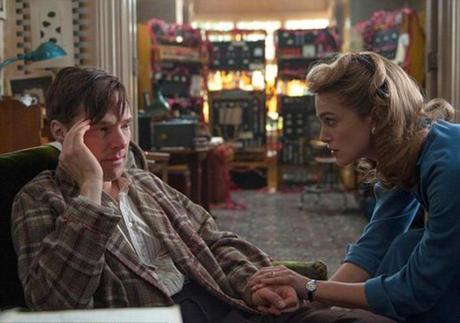According to Variety: “Michelle Obama lauded The Imitation Game … for helping to break stereotypes about gay people.”
Excuse me while I gnash my teeth. What the fuck is the First Lady talking about? Which stereotypes does the Graham Moore-scripted film challenge?
The only belief I had challenged was that Hollywood is capable of making a non-offensive film about a gay person.

“Don’t be gay…”
The Imitation Game is supposed to celebrate the life and work of Alan Turing, the mathematical genius and inventor who helped win World War II by cracking the Nazi’s Enigma code machine. He was later prosecuted to death for being gay. Yet the film goes to huge lengths to shield its audience from the fact that Turing, ahem, fancied men.
Watching, I couldn’t help wondering: “When are they going to get to the bit about him being gay?” Not a single scene depicts adult homosexual attraction or romance. The creators of this smug celebration of white hetero male privilege present Alan Turing (played by Benedict Cumberbatch as Sherlock Holmes in high-waist trousers) as an asexual geek. If it weren’t for the word “homosexual” being used two or three times you literally wouldn’t know he was gay.
There are some pathetically careful allusions to Turing’s love for schoolmate Christopher Morcom in the flashback scenes (notably, this relieves Cumberbatch of any career-jeopardising need to do gay stuff on screen). So we see a young Turing share a couple of fond smiles with Christopher. At one point the boys sit beneath a tree with their (trousered) legs touching. There is the occasional pat on the arm. What’s worse, the film runs so scared of homosexuality that it lies about how old Turing was when the love of his life died. In the movie, Christopher dies when Alan is about 12. In real life, he died a few months shy of Alan’s 18th birthday. Altering the record allows the filmmakers to erase any hint of post-pubescent male attraction.
Far from attacking prejudice, the film’s message is unambiguous: being gay is weird, dangerous, and will ruin your life. Instead of celebrating Turing, The Imitation Game exaggerates and mocks his eccentricities. Cumberbatch plays him as virtually autistic and arrogant to a fault – not a guy you’d want to hang out with. Insofar as he is humanised, it is through his psuedo-romance with Joan Clarke (Keira Knightley). She teaches him how to be nice to his colleagues and, briefly, makes him respectable by accepting his marriage-of-convenience proposal. The unsubtle message is: If only he had fallen in love with a girl all would have been well. If only he hadn’t been so stubbornly queer in both senses of the word.
Its conclusion is even more troubling. We see Turing as an isolated, crumbling man, shattered by the effects of court-mandated “chemical castration” after being convicted of gross indecency. Clarke (happily married, of course) comes to visit. He comments bitterly on her “normal” life. She responds by saying “I bought a ticket from a man who wouldn’t be alive if you were ‘normal’…” blah blah, concluding by “you may wish that you were normal, but I don’t” – as if it’s his intellectual brilliance that’s the problem. This emotional little speech deflects attention from the fact that Turing isn’t outcast because he’s a genius, but because he’s a gay man living under a repressive regime.
The bitter irony The Imitation Game dare not address is that the official British position on homosexuality was indistinguishable from that of Nazi Germany. Homosexuality was outlawed in Germany, as it was in Britain; homosexual men were sent to prison in both countries. Bleakest and blackest of all, the “chemical castration” inflicted on Turing was likely cribbed from Nazi “research”.
After the war, none of the Allies were shy about stealing and building on the Nazis’ brutal medical experiments. One detail of Turing’s torture is too significant to be coincidence: according to the docu-drama Codebreaker the final step in his castration was having a hormone capsule implanted in his thigh.
Where did the British government get the idea? From SS Dr Carl Vaernet who performed that exact “procedure” on gay prisoners at Buchenwald concentration camp as part of Nazi efforts to “find a medical solution to homosexuality”.
World War II has become a cultural fetish because it was supposedly a just war. We are told, ad nauseam, the Allies were good and the Nazis were evil; “our” heroics are contrasted with “their” atrocities. But Britain’s persecution of homosexuality was just as evil as the Nazi version. Torture, oppression and murder doesn’t become morally acceptable when “we” do it.
Governments and the corporations that run them make a nice profit on atrocities. They have plenty of wars on the go: wars on drugs, poverty, terror, whatever. It behooves us to think carefully about these things. There is no collective innocence or guilt. We gain no automatic virtue from where we’re born or for whom we voted. We have the freedom and responsibility to make our own moral choices. To believe otherwise is, in itself, a moral choice. We – not our government, our bosses or our society – are on the hook for how we treat each other. Always.
